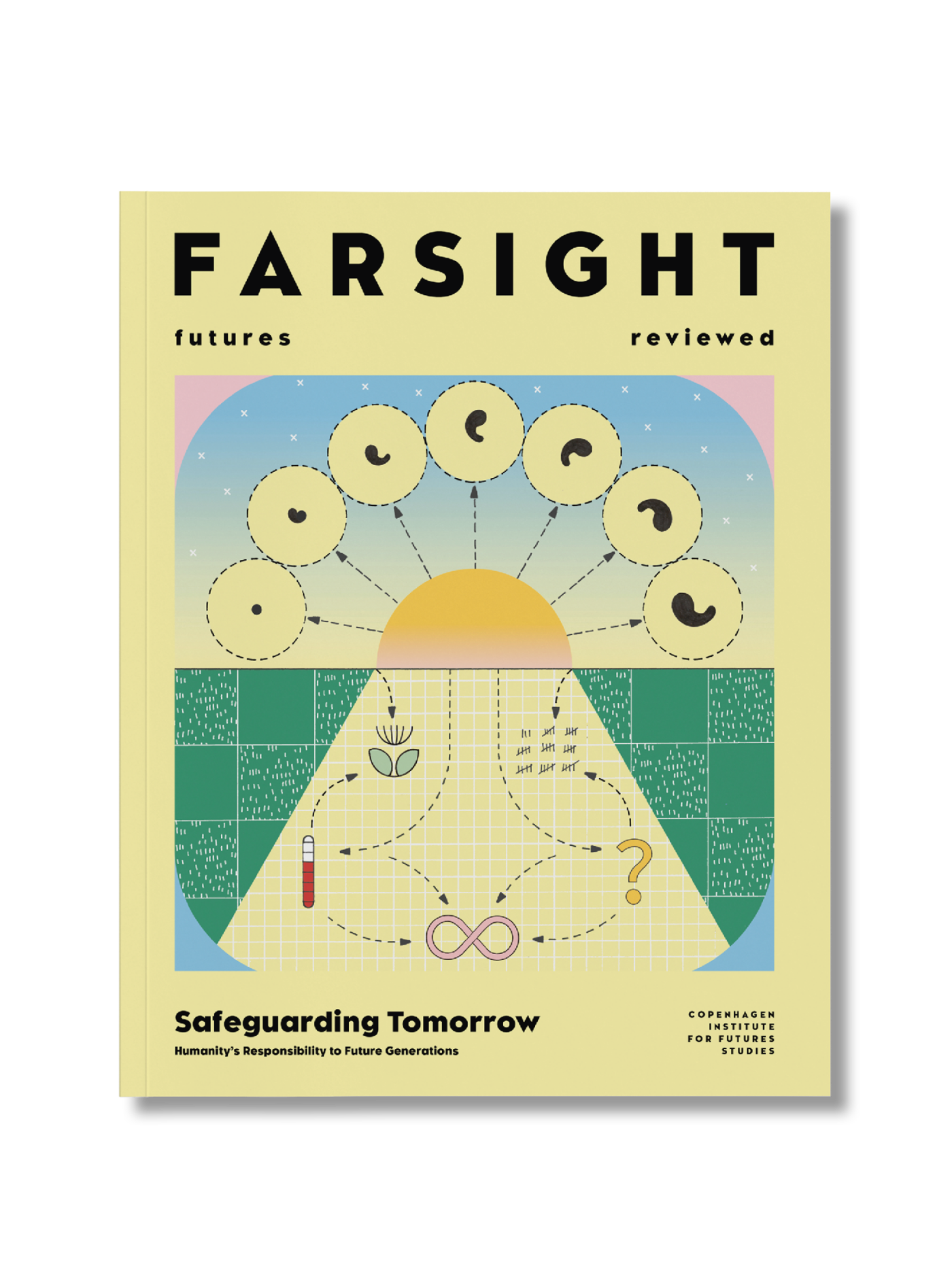
In turn, we use cookies to measure and obtain statistical data about the navigation of the users. You can configure and accept the use of the cookies, and modify your consent options, at any time.

The Case for Anti-Natalism
When safeguarding the interests of the unborn
requires their ultimate non-existence
A conversation with Professor David Benatar.
Illustration: Sophia Prieto
An apparently intuitive question is laid out to the progressively minded futurist: “Should we safeguard the interests of future generations?” For the staunch supporters of ‘longtermist’ ideology, the decisions we take today are laid on a weighing scale against the interests of a near-infinite line of potential human beings in the future. The obvious answer is – “yes.”
One of philosophy’s most controversial figures agrees with this premise. The interests of the unborn, he asserts, are of the utmost importance. However, he arrives at a conclusion many find preposterous: that safeguarding the interests of the unborn can best be done by ensuring that they never are born. In fact, it is always immoral to bring sentient life into existence.
Professor David Benatar joins me on a Zoom call from Ontario, Canada, where he is on sabbatical leave from teaching moral philosophy at the University of Cape Town in South Africa. Since the release of his book Better Never to Have Been in 2006, Benatar has played a crucial role in edging anti-natalism into the mainstream, whether by defending his position against public intellectuals such as Sam Harris and Jordan Peterson, or by being the source of inspiration for Matthew McConaughey’s misanthropic character in the HBO series True Detective. His views have also led him to being the brunt of countless ideological misrepresentations and personal attacks. Abandon any conclusions and biases you have already formed, for if Benatar’s argument is sound, the necessary consequence is the voluntary extinction of the human race.

Broaden your horizons with a Futures Membership. Stay updated on key trends and developments through receiving quarterly issues of FARSIGHT, live Futures Seminars with futurists, training, and discounts on our courses.
become a futures memberFirstly, Benatar mentions that it is important for us to distinguish between bringing a life into existence and continuing to exist: once a person is born, they have a vested psychological interest in continuing to live. His argument, however, does not concern such cases whatsoever. Rather, it surrounds the potential beings that we deliberate on bringing into the world.
Benatar explains that “when you deliberate whether to create a being, you consider two scenarios: one in which the person comes into existence and one in which the person doesn’t. I think that the harms the person would experience in the case of existence would be bad. And if you choose to not bring them into existence, those absent harms would be good.”
“In an ordinary course of events, a potential being would also have some benefits (or pleasures) within their life that would be good. But if we fail to bring them into existence, the absence of those benefits is not bad. And the reason why it’s not bad is because there is nobody being deprived of those pleasures.”
This intuition is reinforced by Benatar’s argument resting on the premise that there is, on an objective level, simply more pain than pleasure in each life. We often think otherwise due to a range of psychological mechanisms, often evolutionarily pre-programmed to ensure our survival:
“Most people think that it’s better that they came into existence. Most people think that their lives are, on balance, a net good,” Benatar says. He points towards the optimism bias as an example reinforcing these beliefs: “There’s a whole array of data establishing the variety of ways people tend to recall the good more than the bad, and how they tend to think that things will go better than they actually will. For example, if you ask people what their quality of life is relative to others, most people think that it’s above average – which would be an impossibility.”
There are other cognitive biases we hold that sow doubt about the reliability of subjective assessments of our own wellbeing. For example, instead of examining how good a human life is on an objective level, we tend to evaluate our level of suffering relative to that of other individuals:
“One effect of this is that you’re going to filter out the bad things that are common to all people. And if there’s a lot of bad that’s common to all people, you’re going to filter that out.” Examples Benatar brings forth are the physical pains of sickness, the torment of eventual death, and a diverse range of other discomforts shared by all human beings. To further emphasise how widespread suffering is on an empirical level compared to pleasure, he encourages me to consider the phenomenon of chronic pain – pain that can just go on and on and on. “There’s no such thing as chronic pleasure – it just doesn’t exist. You can have chronic satisfaction; some people have that. But likewise, there also exists a chronic sense of dissatisfaction.”
Lastly, Benatar reminds me how we often adapt to negative circumstances by shifting our baseline for wellbeing, obscuring the objective amount of suffering we might be experiencing in a given situation. “If you’re in an accident, for example, and you lose the use of your legs, then you would have a drop in subjective assessment of wellbeing immediately following the accident. But even if you don’t regain use of your legs, your subjective assessment of wellbeing will come up towards the pre-accident condition after a period of time.”
Benatar also believes that the empirical asymmetry between pleasures and pains is both quantitative and qualitative: not only is there more pain than pleasure in an average human life, but we instinctively treat them as two distinctive categories, rather than sensational counterparts: “You can ask people whether they’d take a deal. Would they be willing to be subjected to the worst pains imaginable for an hour if they could enjoy the most sublime pleasures for the remaining 23 hours of the day? And most people just won’t take that.”
I feel compelled to ask a question which has been nagging me since the start of the interview. As someone working among futurists and science-fiction obsessives, I can’t help but wonder how Benatar would respond to, for example, a future neural implant that alleviates the physical sensation of pain (while still reminding oneself that pain receptors are firing off). If we could artificially adjust the balance of suffering to pleasure via technology, would his anti-natalist conclusion be void? Benatar does not think so:
“Let’s imagine that in some distant point in the future this happens. Would reproduction be justified in the interim? Here, the example that I like to think about is anaesthesia. Anaesthesia is a relatively modern phenomenon – it is from the 19th century. For hundreds of thousands of years humans were reproducing with the knowledge that if their child needed a tooth extracted, or a limb amputated, that this would have to be done without anaesthesia. Now let us imagine some ancient optimist who claims that one day there will be a point where future generations will have something called anaesthesia, where you can be put under and not feel the tooth removed or, or the limb amputated. I’d reply, as some other pessimistic philosopher at the time would say, ‘can we really justify procreation for generation upon generation until we reach that point?”
Could one not argue that it doesn’t matter if we employ a range of psychological mechanisms to heighten our subjective wellbeing, even if on an objective level, our lives might contain more suffering than pleasure? Happiness arguably exists within the confines of an individual mind after all – who cares how much suffering there might be on an objective level?
Benatar disagrees with this as well, suggesting that this line of reasoning results in all sorts of absurd conclusions: “One analogy I like to think of is this: imagine somebody genetically engineers a slave. And although the slave suffers great hardship, they will ultimately endorse the position they are in – they will be happy to be slaves. Now you need to ask yourself whether it would be acceptable to breed a being of this kind. Would it be acceptable to keep producing more of the slaves that are content in the position, even though they are suffering a great deal?”
I briefly consider whether we are taking a too carnal view of pleasure and pain. One could argue that many of life’s pleasures aren’t necessarily located in the sensational by-products of our nervous system, but arise from abstract concepts unique to humanity, such as meaning or knowledge. Benatar doesn’t seem to believe that these things justify procreation either:
“If you include knowledge in your determinants for quality of life, then you have to also consider where on the spectrum from knowing nothing to being omniscient any one of us fall.” Furthermore, striving for meaning is insufficient to justify existence too: a pre-condition of Benatar’s anti-natalism is rejection of a God, culminating in something resembling Cosmicism, the belief that humans are ultimately insignificant in the grander scheme of existence. It follows from this line of reasoning that the innate limits of the human mind render the pursuit of many abstract ideals a largely futile endeavour. Indeed, Benatar’s anti-natalism does not consider human beings special; his view that suffering is the fundamental contition of life extends to all sentient beings.
Having wrapped up Benatar’s worldview, we shift the conversation to what can be done today to safeguard the non-existence of future generations.
“It’s obviously an implication of my view that a world in which there are no more human beings, nor sentient beings, is a much better world than the one that exists now,” he says. The absence of suffering culminating in the sweet bliss of planetary inertia. “If we were really interested in safeguarding the interests of future people, I think the way that we would do that is by not creating more of them. But at the same time, it would be naive to think that everybody is going to act on that view. One other measure is, thus, to pay attention to the interests of those beings that will eventually exist, even if you and some others are not reproducing.”
In other words, Benatar’s anti-natalism is not mutually exclusive from other movements like, say Effective Altruism, which aim to raise the standard of well-being and reduce suffering for future generations. It’s a part of that same philosophy. He also rejects coercive anti-natalist policies – ideally, the road to voluntary extinction does not infringe on the rights of existing people. And although Benatar believes that we engage in a form of “delusional optimism” when assuming that we will voluntarily bring about a utopian future absent of suffering (whereas it being certain that one day all life on Earth will go extinct) he nonetheless believes that we can still make great strides in reducing suffering and unhappiness today.
Thus, a slow phasing out of humanity is Benatar’s preferred practical method of human extinction. In fact, by some estimates, our global population is already tending towards decline amid plummeting fertility rates. A gradual phasing out of the human race eventually resulting in a melancholic coda. A realisation that one’s generation is the last. That this is the end.
“When this happens, it is likely to be miserable. I suppose it could happen in an instant. But the much more likely scenario is that there will be considerable suffering for the final people on account of there not being new generations ahead. And some people might take that to be an argument in favour of procreation. I don’t. I take that to be a kind of Ponzi scheme where you have to keep producing new generations of sufferers in order to try to keep the existing people from suffering the costs of not having new generations.”
A world without humans. A world without sentient beings. The emptiness of thought swallowing the planet whole. This condition is not to be lamented either, Benatar says. “We may have a sentimental feeling that ‘Gee, none of our legacies nor our civilizations will continue.’ But if you’re asking whether it’s bad for the people who could have been there, then no, it’s not.” In fact, to Benatar, this state of affairs can only be good.
Questioning whether we can ever escape the confines of our own subjectivity, I realise that I will never be able to envision what a planet devoid of sentience would be like. It’s a scenario that sends me into a nihilistic frenzy and David into a state of content. An hour of talking human extinction has worn me slightly down – I cannot help but wonder what kinds of criticism have been levied against Benatar given the perceived extremity of his views.
There is one question, he tells me, that always pops up, usually accompanied by some kind of abuse as well: “The most common one is, ‘Why hasn’t this guy killed himself?’ And well, I just know that they haven’t read or understood what the argument is,” Benatar says, while letting out a brief chuckle. We then wrap up our conversation, contrast the weather in Ontario to Cape Town, and bid each other farewell.
If the philosophers of the 19th and 20th centuries were concerned with examining the human condition after the death of God – then perhaps the 21st will apply this examination to the unborn. As futurists, we assume an inherent value in posterity. We envision ways of bettering the conditions for potential humans via societal paradigm shifts and technological innovations. However, while engulfed by such imagination, we lose sight of a fundamental assumption: that existence is preferable to not being born at all. That the absurd mosaic of lived experience trumps an eternal future in the universe’s womb.

This is an article from
FARSIGHT: Safeguarding Tomorrow
Grab a copy here